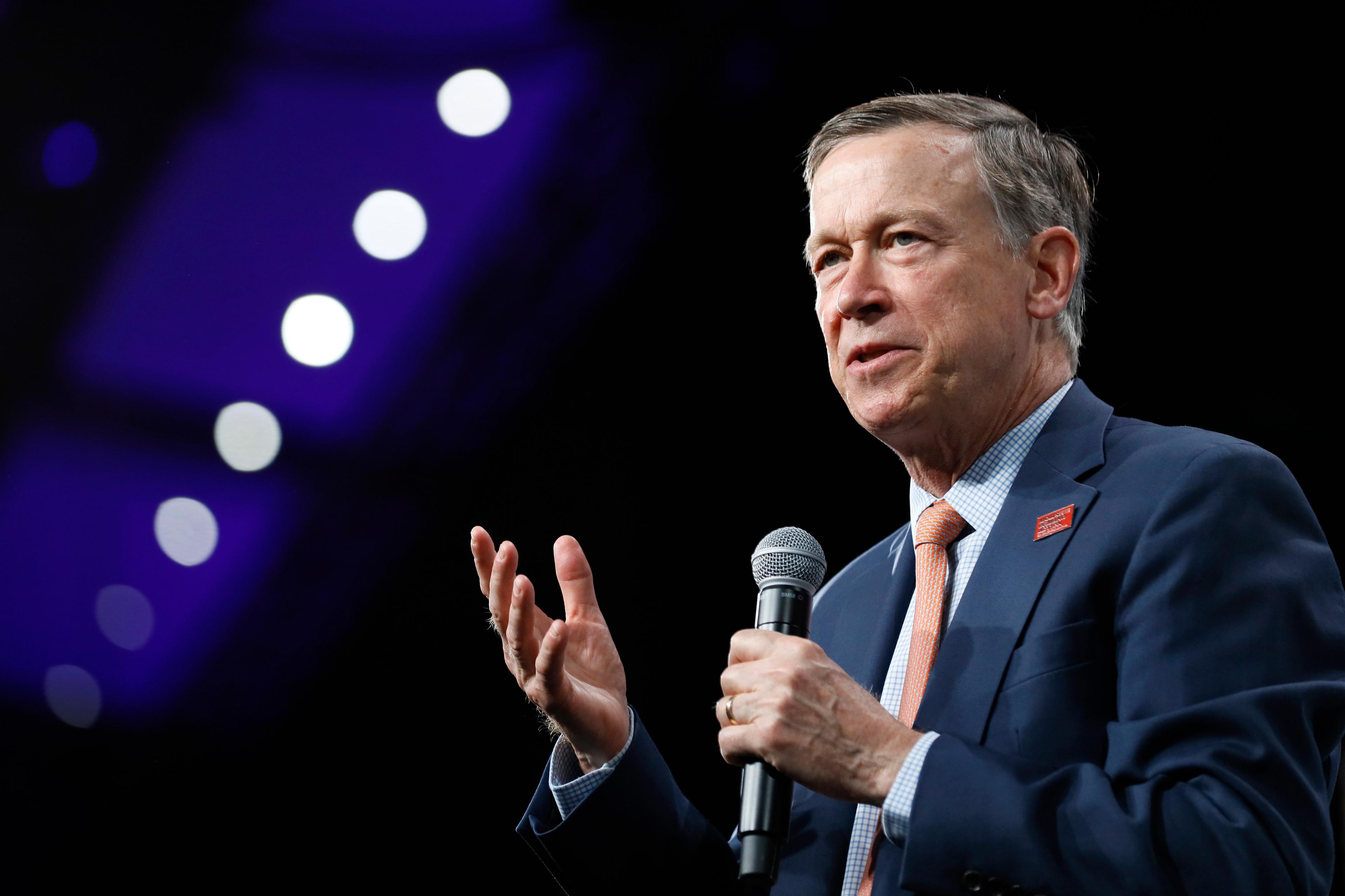
UPDATE: The ethics commission has concluded that Hickenlooper violated Colorado's gift ban during two of his trips, but dismissed the other four instances in the complaint. It will meet next week to discuss imposing a penalty.
Our original story continues below.
Former governor John Hickenlooper is the subject of multi-day hearings by the state’s Independent Ethics Commission, in a case that could shape his run for U.S. Senate. The complaint is wrapped up in layers of intrigue, confusing delays, and now a contempt citation against Hickenlooper himself. Confused? Here’s what to know.
How did we get here?
The IEC received a complaint about Hickenlooper on Oct. 12, 2018. The complaint was filed by Frank McNulty, a Republican who served as Speaker of the House while Hickenlooper was governor. McNulty filed the complaint through his recently formed group, the Public Trust Institute.
The ethics commission reviewed the case and unanimously decided that it was “non-frivolous.” A year later, in Nov. 2019, it completed its investigation and released a report about the complaint, though it didn’t draw any conclusions.
The next step in the ethics complaint process is for the commission to hold a hearing to settle matters of fact, which it originally scheduled for March. Hickenlooper agreed to testify, but the IEC had to delay due to coronavirus. The commission announced it would hold a virtual hearing on June 4, but Hickenlooper objected, arguing that the virtual format would infringe on his due process rights. His team raised several concerns, including the idea that technical glitches would interfere with witness testimony.
The legal wrangling over the format is ongoing: The commission issued a subpoena to compel Hickenlooper to appear. His lawyers went to court to quash it. The judge disagreed, basically ruling that the show would go on.
On Thursday morning, when the giant WebEx meeting convened, Hickenlooper’s lawyers were there, but the former Governor was not. The commission voted unanimously to find Hickenlooper in contempt and asked the Attorney General’s office to compel his testimony. His attorneys say he shouldn’t have to appear because he’s still appealing the ruling on the subpoena.
Hickenlooper began testifying on Friday morning.
What are the allegations?
The complaint alleged that Hickenlooper illegally accepted flights, lodging and meals in 2017 and 2018. The complaint alleged that those trips were forbidden under the state’s ban, which sets a strict cap on the value of gifts public officials can accept. At the time, the limit was $59.
The complaint singled out more than a dozen trips it claimed were suspect, but the commission is considering just six. Several were excluded because they happened too long ago, while the IEC dismissed other parts of the complaint earlier, in one instance because the state itself had paid for the travel.
PTI claims an “illicit pattern of abuse in which Governor Hickenlooper has repeatedly violated Amendment 41 and attempted to conceal the violations.”
But Hickenlooper’s team argues there are several exemptions to the ban, including trips for official business, as well as “special occasions” with friend; his attorneys say that all of the travel in question falls under exemptions. They denied that any of the people who provided travel were trying to lobby Hickenlooper.
Here is how Hickenlooper defended each trip specifically, citing the state’s laws and opinions from the IEC:
Trip to Italy: Hickenlooper said he paid his own way to the Bilderberg Meetings in Turin, Italy in June 2018. But PTI contends that he had received gifts from the sponsors of the conference, Fiat Chrysler, like a ride in a limousine.
“He was under the understanding that he had paid for all conference expenses,” said attorney Mark Grueskin. “There was no ability on the part of anyone to pay for anything other than (airfare and lodging.)”
Suzanne Staiert, arguing for PTI, said it was part of a pattern of hobnobbing with the “glitterati,” adding: “He paid $1,500 for his room and a foreign corporation picked up the rest.”
- The vote: The Commission concluded that Hickenlooper violated the gift ban by accepting luxurious meals and travel during his time at the conference.
Colorado to Connecticut: Hickenlooper confirmed that MDC Holdings flew him on a private plane to Connecticut for the commissioning of the U.S.S. Colorado. MDC is led by developer Larry Mizel, whom Hickenlooper said is a friend. Hickenlooper’s team said that the travel was allowed because he was acting in his official role, including by giving speeches.
“It was not a trip provided to Hickenlooper for any purpose other than to facilitate his role as Governor,” their response reads, citing an advisory opinion from the IEC.
During Thursday’s hearing, Staiert called state Sen. Bob Gardner, a Republican, and had him talk about paying his own way and eating at McDonald’s for the same event.
- The vote: The Commission concluded that although Hickenlooper paid for his travel, he violated the gift ban by accepting luxurious meals and travel during his time at the conference.
New Jersey to Colorado: Hickenlooper joined his wife in New York City in January 2018 so she could have a medical procedure. He returned home on a private flight paid for by entrepreneur Kenneth Tuchman, which allowed Hickenlooper to arrive “just in time for his State of the State speech.”
Hickenlooper’s team defended the flight as a personal favor under extraordinary circumstances, qualifying under an exemption for gifts from “a personal friend” on “a special occasion.”
As in other cases, Staiert argued that the flight was provided by the corporation that controlled the plan, rather than by Tuchamn himself. “The governor is asking that an outsourcing corporation with approximately 448,000 employees should count as a personal friend,” she said. She argued too that state business must be funded by the state.
- The vote: Commissioners concluded this travel was covered by the personal friend exception.
Kimball Musk’s wedding in Texas: Hickenlooper took a flight home from Dallas on the private plane of entrepreneur Kimbal Musk. Hickenlooper’s team defended it as a personal trip, since he was officiating Musk’s wedding, and also offered that the trip was an honoraria for his role as officiant.
- The vote: Commissioners concluded this travel was covered by the personal friend exception.
Washington, D.C. to Jackson Hole, Wy.: Hickenlooper’s chief of staff, Patrick Meyers, flew Hickenlooper to Jackson Hole on a private leased plane. Meyers said it was a way to save time and money. Meyers was heading to Denver, so Jackson Hole was a detour.
Hickenlooper’s team defended the trip on two grounds -- as official business, since he spoke at the American Enterprise Institute’s conference in his role as governor, and as a special occasion with a personal friend.
The trips “were all bought and paid for by corporations, they all had potential conflicts of interests, they were all lavish expenditures that benefited Mr. Hickenlooper directly,” Staiert said, faulting Hickenlooper for not seeking advisory opinions.
- The vote: Commissioners concluded this travel was covered by the personal friend exception.
Washington, D.C. to Centennial: Hickenlooper made this flight in Oct. 2018 on Meyers’ plane. He claimed he had been in Washington on a “multifaceted” trip that included state business. The flight was already scheduled and Hickenlooper took an open seat, according to his response. His team defended it, again, as a special occasion with a friend, and Staiert reiterated her earlier points.
- The vote: Commissioners concluded this travel was covered by the personal friend exception.
What happens next?
The IEC will meet next week to decide on the amount of a fine, and whether to sanction Hickenlooper for defying its subpoena, but it’s the symbolic power of the case that really could hurt Hickenlooper. The finding that he violated the gifts ban could potentially hang over his campaign in the U.S. Senate race. So could the drama over his defiance of the subpoena.
He goes up against former House Speaker Andrew Romanoff in the June 30th primary, to see who will run against Republican Sen. Cory Gardner in November.
The commission was created by a constitutional amendment in 2006. Its purpose is to hear complaints and issue findings. Its members are appointed by the governor, the legislature and the chief justice of the Colorado Supreme Court. Gifts are one of its main topic areas.
Who are the other players?
McNulty is a former Republican state Speaker of the House and a continuing force in Colorado Republican politics. He formed the Public Trust Institute two days before initiating the complaint.
Hickenlooper’s team has also implicated a national Republican group in the case. One of their filings implies that an employee of America Rising Corp., an opposition research group, conducted the original public records research for the complaint against Hickenlooper.
In an earlier interview, McNulty declined to say whether America Rising helped research the complaint.
Hickenlooper’s own team is paid by a mixture of state and Democratic money. The state has paid Grueskin $525 an hour to defend Hickenlooper in the ethics case, a common practice for current and former elected officials accused of something in their official capacity, as The Denver Post reported. Hickenlooper’s attorney in the fight over the subpoena, Marc Elias, is funded by the Democratic Senatorial Campaign Committee.
This article was updated to correct the location of the Bilderberg Meetings.









